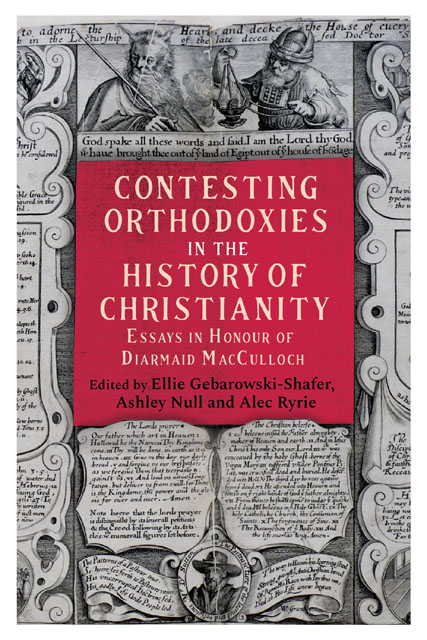Book contents
- Frontmatter
- Contents
- List of Illustrations
- List of Contributors
- List of Abbreviations
- Introduction
- 1 ‘Jewish Christianity’ in Antiquity: Meaningless Category or Heuristic Irritant?
- 2 ‘Sola Fide’: the Wrong Slogan?
- 3 Both Cromwellian and Augustinian: the Influence of Thomas Cromwell on Reform within the Early Modern English Austin Friars
- 4 Lex, Rex and Sex: The Bigamy of Philipp of Hesse and the Lutheran Recourse to Natural Law
- 5 The Authority of Scripture in Reformation Anglicanism: Then and Now
- 6 Orthodoxy and Heresy in the Post-Reformation
- 7 Profanity and Piety in the Church Porch: the Place of Transgression in Early Modern England
- 8 Writing on the Walls: Word and Image in the Post-Reformation English Church
- 9 The Myth of the Church of England
- 10 Mysticism, Orthodoxy and Reformed Identity before the English Revolution: the Case of John Everard
- 11 Sacrilege and the Sacred in England’s Second Reformation, 1640–1660
- 12 ‘I had not the patience to be quiet’: Arthur Bury and The Naked Gospel
- 13 ‘A soul-corrupting indifferentism’: the Intellectual Development of Benjamin Henry Latrobe
- 14 Newman, Dogma and Freedom in the Church
- 15 ‘Tommy, ’ow’s yer soul?’ Reconsidering Religion and the British Soldier
- 16 The King James Vulgate
- 17 The Myth of the Anglican Communion?
- Select bibliography of Diarmaid MacCulloch’s scholarly publications
- Bibliography
- Index
- Tabula Gratulatoria
- Studies in Modern British Religious History
9 - The Myth of the Church of England
Published online by Cambridge University Press: 09 January 2024
- Frontmatter
- Contents
- List of Illustrations
- List of Contributors
- List of Abbreviations
- Introduction
- 1 ‘Jewish Christianity’ in Antiquity: Meaningless Category or Heuristic Irritant?
- 2 ‘Sola Fide’: the Wrong Slogan?
- 3 Both Cromwellian and Augustinian: the Influence of Thomas Cromwell on Reform within the Early Modern English Austin Friars
- 4 Lex, Rex and Sex: The Bigamy of Philipp of Hesse and the Lutheran Recourse to Natural Law
- 5 The Authority of Scripture in Reformation Anglicanism: Then and Now
- 6 Orthodoxy and Heresy in the Post-Reformation
- 7 Profanity and Piety in the Church Porch: the Place of Transgression in Early Modern England
- 8 Writing on the Walls: Word and Image in the Post-Reformation English Church
- 9 The Myth of the Church of England
- 10 Mysticism, Orthodoxy and Reformed Identity before the English Revolution: the Case of John Everard
- 11 Sacrilege and the Sacred in England’s Second Reformation, 1640–1660
- 12 ‘I had not the patience to be quiet’: Arthur Bury and The Naked Gospel
- 13 ‘A soul-corrupting indifferentism’: the Intellectual Development of Benjamin Henry Latrobe
- 14 Newman, Dogma and Freedom in the Church
- 15 ‘Tommy, ’ow’s yer soul?’ Reconsidering Religion and the British Soldier
- 16 The King James Vulgate
- 17 The Myth of the Anglican Communion?
- Select bibliography of Diarmaid MacCulloch’s scholarly publications
- Bibliography
- Index
- Tabula Gratulatoria
- Studies in Modern British Religious History
Summary
This essay considers an example of how shifting orthodoxies can be disguised as continuities by the use of linguistic ambiguities, and also how the universal claims of orthodoxy can clash with the particular claims of nationalism. Henry VIII legitimised his schism and other religious innovations in part by mobilising the term ‘the Church of England’, a long-standing but relatively little-used phrase which was now infused with new and nationalistic meanings. The essay argues that by the later sixteenth century the phrase ‘the Church of England’ had at least four distinct meanings, ranging from innocuous descriptive reference to the historic church in that country to the specific set of ritual and legal norms that the established church under Elizabeth I had instituted; and that blurring the distinctions between those meanings, so as to give the Tudor reforms a veneer of ancient orthodoxy, provided those reforms with critical and under-appreciated legitimacy. It also looks at how, when the stresses of the Civil War era forced some of those meanings apart, advocates of those ritual and legal norms were driven to adopt a new terminology, that of ‘Anglicanism’, which claimed orthodoxy less from being one part of the universal Christian church and more with reference to the specific history of the English nation.
The myth of the Church of England is that such a thing exists. That the institution which goes by that name is more than just ‘an English church’, more even than ‘the church by law established within England’; that it is now, and has been since time out of mind (for the date is contentious), ecclesia Anglicana, the definitive national Church which constitutes, or at least ought to constitute, the religious life of England’s Christian people. Like most myths, it seems futile to ask whether or not it is factually accurate. It has a persistent importance quite separate from the question of whether it is true or false.
The Church of England’s shifting and contested identity, and the meaning and boundaries of ‘Anglicanism’, have been recurrent themes in Diarmaid MacCulloch’s scholarship and continue to provoke rich and profound historical and theological discussion. This essay attempts something altogether more modest and superficial. It looks at the myth of the Church of England from the perspective of terminology, looking at two labels which, during the sixteenth and seventeenth centuries, acquired new meanings and hardened into orthodoxies: ‘the Church of England’ and ‘Anglican’.
- Type
- Chapter
- Information
- Contesting Orthodoxies in the History of ChristianityEssays in Honour of Diarmaid MacCulloch, pp. 159 - 175Publisher: Boydell & BrewerPrint publication year: 2021



